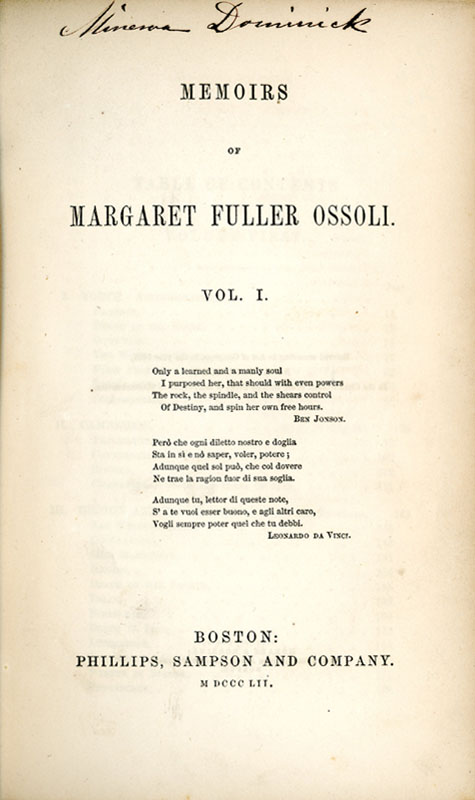This post was written by Emily Rusch, Research Services Assistant.
Come visit Fenwick Library and check out our civil rights exhibit on the second floor! This exhibit highlights three different civil rights movements that took place in the United States. These three movements focused on equal rights for African-Americans, women, and the LGBTQ community. Our selected collection of books, photographs, plays, and letters show different perspectives on the various issues these groups have faced in the United States. Many of these documents show events that happened around the year 1968, when congress passed the Civil Rights Act of 1968, also known as the Fair Housing Act. One person featured in our exhibit is author Margaret Fuller.
Margaret Fuller was a women rights activist, journalist and critic who is known for her influence on the American transcendental movement. Transcendentalism was a political, literary and philosophical movement that started in the early 1800s. Margaret Fuller and other famous transcendentalists, such as Ralph Waldo Emerson, criticized society for its conformity and unoriginality. Fuller became the first editor of the transcendentalist journal, The Dial, and later joined the staff of the New York Tribune. She was an advocate for women’s rights, especially the right to a higher education, and was the first woman allowed to use the library in Harvard College. In addition to women’s rights, Fuller advocated for prison reform and the emancipation of slaves. Her book, Woman in the Nineteenth Century, was published in 1845 and is considered to be the first book written on women’s rights.
The Special Collections Research Center carries the book titled Memoirs of Margaret Fuller Ossoli. Memoirs was edited by Ralph Waldo Emerson, James Freeman Clarke, and William Henry Channing and published in 1852, two years after Fuller’s death. The book focuses on Margaret Fuller’s personality, early life and travels to Europe. Although Fuller’s book was published in the mid-1800s, her work continued to inspire the American Civil Rights movements throughout the twentieth century.
Source:
“The Memoirs of Margaret Fuller Ossoli.” Southern Illinois University, 2018, https://www.siue.edu/artsandsciences/english/rbss/gallery/Memoirs_of_Margaret_Fuller_Ossoli.shtml. Accessed 24 October 2018.
Follow Special Collections Research Center on Social Media at our Facebook, Instagram, and Twitter accounts. To search the collections held at Special Collections Research Center, go to our website and browse the finding aids by subject or title. You may also e-mail us at speccoll@gmu.edu or call 703-993-2220 if you would like to schedule an appointment, request materials, or if you have questions. Appointments are not necessary to request and view collections.

